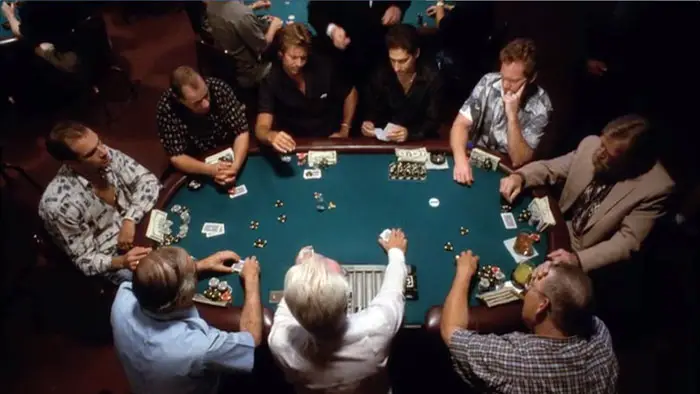
“Brothers of the Head” is NOT about a toilet-maker’s union, and it doesn’t concern a Harlem men’s room. No, it’s a much stranger look at fraternal bonding, involving co-joined twins tangled deep within a warped web of sex, drugs, and rock ‘n roll.
Did Tom and Barry Howe, adhered twins-come-pioneering punk rockers, really exist? According to the twisted history of co-directors Keith Fulton and Louis Pepe (“Lost in La Mancha”), the Howe brothers’ conflicted-yet-codependent personalities found release through the purging spirit of early seventies rebel rock. “Brothers of the Head” pieces together the twins’ early historical evolution from unknown inhabitants of an isolated UK cottage into Bang Bang, a defiant, chemical-gobbling rock band. Attached at the waist by a fleshy band of tissue, volatile singer Barry and sullen guitarist Tom delivered freak show angst of the type Alice Cooper could only dream. Inevitably, the Howe Brothers would meet their doom, after a woman entered their warped, intimately connected union.
But come on now. Is this for real?
Nah. Scripted by Tony Grisoni, “Brothers of the Head” is based on Brian Aldiss’ 1976 book (Aldiss’ prolific body of sci-fi work inspired Steven Spielberg’s “A.I.”). And as mockumentaries go, it’s disturbingly convincing. Gone are the calculated Christopher Guest punch lines to remind us we’re only watching a movie (no exploding drummer here). Meanwhile, much of the footage maintains a static, passive quality. There’s no overdone, manic camera moving, ala “Blair Witch Project.” Fulton recently stated that contrary to popular belief, most documentarians attempt to hold the camera as steady as possible, avoiding what he describes as the “shaky-cam” cliché. It makes sense.
Inhabiting this filmic acid trip and forever orbiting the twins is Zak the Impresario (Howard Attfield), who plucks these fraternal curios from obscurity and takes advantage of their appearance for rock ‘n roll profits. In typical capitalist denial, Zak declares, “I never exploited anyone who didn’t want to be exploited.” There’s also Nick the Manager (Sean Harris), pounding Barry with ready fists when the disobedient singer gets out of line. Tom Bower plays leathery, seen-it-all documentary moviemaker Eddie Pascqua, whose motives become suspect. Why is it that this somewhat sinister lensman lurks behind the twins in bathrooms, showers, and bedrooms in his effort to immortalize their every move?
Front and center are Barry and Tom Howe, played by real-life identical twins Luke and Harry Treadaway. The actors create a realistically detached quality, always keeping us one step removed from who these siblings really are. For some audience members, this effect might prove emotionally unsatisfying. But it lends the Howes a mysterious quality that cameras simply can’t explain. The more that Pascqua tries to burrow beneath their exteriors, the less he is able to reveal. This might not provide dramatic payoffs, but think about it – aren’t most rock icons nearly impossible to dissect on film? “The Song Remains the Same,” Led Zeppelin’s 1976 doc, certainly didn’t get under Jimmy Page’s occult-enshrouded skin.
Cineastes will drool over the presence of legendary filmmaker Ken Russell, playing himself as director of “Two Way Romeo,” a feature film based on the Howe’s bizarre life story. Shown in fits and snippets, this movie-within-the-movie is a gothic, creepy little morsel that certainly looks and feels like something veteran freakmaker Russell (whose “Tommy” tread similar ground) would helm. Meanwhile, the film’s scenes of early seventies rock culture also ring true, thanks in part to the collaborative assistance of punk-era record producer Clive Langer, who composed much of Bang Bang’s original, surprisingly energized material.
With reality television dominating today’s boob tube menu, the current cultural zeitgeist consists of gazing at real people doing real things. But we all know that through scripting, editing, and other manipulations, T.V. phenomenons like “American Idol” and “Survivor” are anything but the raw, candid experiences they bill themselves as. Is reality T.V. truly documentary? Meanwhile, are live action films an entirely fictional enterprise? We’ve all heard the stories of cameras continuing to roll beyond “cut,” and directors integrating this candid footage into their work. Where, then, is the line between live and Memorex?
With “Brothers of the Head,” Fulton and Pepe have created a fiction film in the spirit of a rock doc, further blurring this line. It’s not a comedy, ala “Spinal Tap,” and those anticipating broad belly laughs will be disappointed. Rather, the film is a reinvention of the phony documentary, and the kind of grand, artistic experiment that seldom ever makes the big screen. You’re not likely to understand Tom and Barry Howe as the credits materialize. But that’s the point. Sometimes, despite slicing away with the sharpest of scalpels, you just can’t dissect the mystery behind what makes an artist tick. Like a good rock record, “Brothers of the Head” isn’t easily explained. But its original fusion of real and surreal will cling to your cranium for years.

Thank God that was not a true story. I was deeply moved! Now I can sleep knowing they were fictional characters!